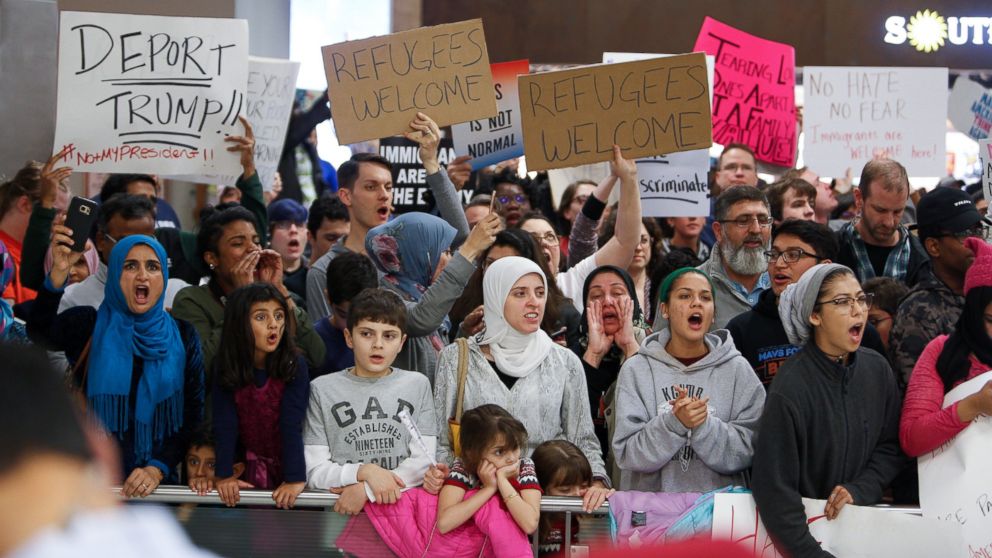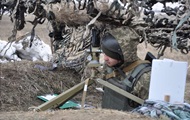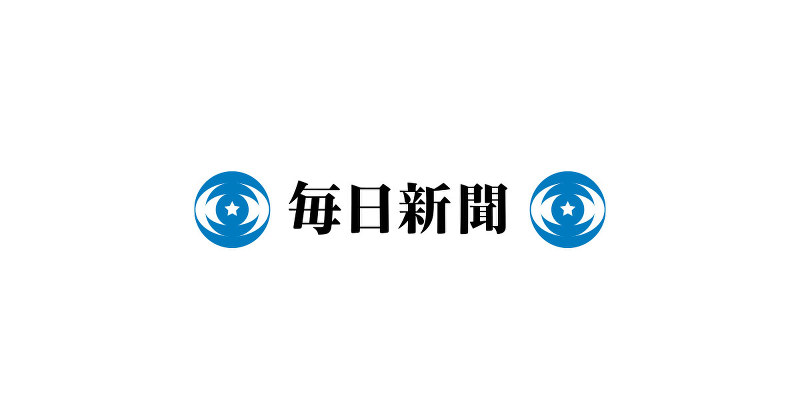 A federal court in Brooklyn tonight granted an emergency stay on President Trump’s executive order that bans immigration from seven predominantly Muslim countries for two Iraqi men who had valid visas to enter the United States but were detained today when they arrived in New York.
A federal court in Brooklyn tonight granted an emergency stay on President Trump’s executive order that bans immigration from seven predominantly Muslim countries for two Iraqi men who had valid visas to enter the United States but were detained today when they arrived in New York.
Trump’s order calls for an immediate suspension of immigration from countries with ties to terror, including Syria, Yemen, Sudan, Somalia, Iraq, Iran and Libya, for a time period of 90 days. It also calls for the complete suspension of Syrian refugees for an indefinite period.
Following the court’s decision, the Department of Homeland Security said in a press release that it “will continue to enforce all of the president’s Executive Orders in a manner that ensures the safety and security of the American people. The president’s Executive Orders remain in place—prohibited travel will remain prohibited, and the U. S. government retains its right to revoke visas at any time if required for national security or public safety. “
It added, “The Department of Homeland Security will faithfully execute the immigration laws, and we will treat all of those we encounter humanely and with professionalism. “
The ACLU, which had filed the challenge on behalf of the two men, contended that the stay applied nationally to all cases, but that was not clear from the ruling. ABC News was attempting to clarify whether that was the case.
WATCH: ACLU Executive Director Anthony D. Romero coming out of the court where the ACLU just argued and won block of Trump’s Muslim ban. pic.twitter.com/kvWDgWiUIn
The ruling does not appear to overturn administration policy, but does appear to apply to all of those people currently detained at airports across the country who were facing imminent deportation. The judge asked repeated questions of the federal prosecutors charged with defending the executive order, but they were unable to provide numbers of people who were facing the prospect of returning to a country where there lives would be in danger.
The order came as protests spread to airports across the country, after passengers were detained or sent home from at least 10 different airports — according to officials from the airports — and hundreds of people around the world were barred from boarding U. S.-bound flights.
A senior Department of Homeland Security official provided the following figures late Saturday night: 375 travelers have been impacted in one way or another by the executive order. Of those 375 travelers, 109 were in transit to the U. S. and denied entry, 173 were denied entry to the U. S. prior to boarding their flights in a foreign port, and 81 were granted waivers because of their legal permanent resident or special immigrant visa status.
Officials anticipate a smaller number of travelers will be impacted Sunday, now that the policy is in full effect.
Passengers were detained or sent home from the following airports, and the corresponding figure for the number of people affected represents a compilation from various sources, including the ACLU, protest, airport, and government officials, unless otherwise stated. The Department of Homeland Security has not released an exact breakdown by airport. (Figures as of Sunday at 4:30 a.m. ET):
Chicago O’Hare International Airport (13 passengers, per ABC affiliate WLS), Dallas/Fort Worth International Airport (9 passengers), Philadelphia International Airport (6 passengers), Washington Dulles International Airport (exact figure unknown, but at least 3), Los Angeles International Airport (at least 7 people), Atlanta Hartsfield-Jackson International Airport (11 people), Boston’s Logan International Airport (2 people), Seattle–Tacoma International Airport (2 people), Denver International Airport (4 people), and San Francisco International Airport (at least 3 people, according to protest organizers).
Hundreds of people turned out at John F. Kennedy International Airport to protest the president’s order, chanting “No hate, no fear, refugees are welcome here. No hate, no fear, Muslims are welcome here. “
In New York, the protesters received statements of support from local politicians, including Gov. Andrew Cuomo and Sen. Chuck Schumer.
Hundreds also gathered outside the Brooklyn federal courthouse where the emergency hearing was called on the ACLU’s legal challenge brought on behalf of the two Iraqi men who were detained at JFK Airport this morning. The two men were targeted for their assistance or connections to the U. S. military and were approved for resettlement in the United States.
Two Iraqis who were detained Saturday at John F. Kennedy International Airport in New York City were released later in the day, according to officials. Four other detainees were released early Sunday morning. As of 6 a.m. Sunday, six refugees were still being held at the airport, according to the International Refugee Assistance Project.
One of the Iraqis detained at JFK, Hameed Jhalid Darweesh, was released early today and left with New York Reps. Nydia Velazquez and Jerry Nadler, who joined more than 100 protesters that assembled there. The other, Haider Sameer Abdulkhaleq, was released Saturday evening, shortly before the order from the federal court for the Eastern District of New York.
Darweesh expressed his gratitude for those who supported him while he was detained.
“America is the land of freedom,” Darweesh said. “The land of freedom, the land of the rights. This is what brought me to come here, and I’m very thankful. “
Neither Darweesh nor Abdulkhaleq are technically refugees according to the definition in the president’s executive order but appear to have come to the U. S. on visas, a Trump administration official tells ABC News.
In Seattle, members of Congress from Washington state, Washington Governor Jay Inslee, and Seattle Mayor Ed Murray all spoke out against the executive order.
The executive order contains a caveat that allows certain individuals to be admitted to the country if there is a national security interest in doing so, and these two may be eligible for such an exemption, which must be agreed upon by the State and Homeland Security Departments, but the process by which this happens is unclear.
At least one person was detained at O’Hare International Airport in Chicago today, and it is expected that she will return to Saudi Arabia, according to the Council on American Islamic Relations (CAIR).
Sahar Alghnimi, a Syrian woman who came to the U. S. on tourist visa to see her mother who had just undergone cancer surgery, was detained when she arrived from Saudi Arabia at 8:48 AM on Eithad Airlines, CAIR Chicago executive director Ahmed Rehab told ABC News.
Alghnimi had been to the U. S. several times before and has a valid visa, Rehab said.
In Philadelphia, two Syrian families were detained.
Mayor Jim Kenney issued a statement on Trump’s executive order, suggesting that the detentions were carried out by U. S. Customs and Border Patrol.
In Dallas, nine people have been detained, according to a media representative of CAIR.
Ripple effects from the executive order are also being felt in multinational technology companies.
Google CEO Sundar Pichai circulated a staff memo , obtained by Bloomberg News, in which he criticized Trump’s action and suggested that some of the firm’s employees and their families could be affected by it.
Likewise, several colleges advised foreign students and scholars who might be affected by Trump’s order to defer travel outside of the U. S. at least until there is more clarity on how the order may affect them.
Trump categorized the executive order as part of a vetting plan to prevent “radical Islamic terrorists” from reaching American soil.
The seven-page document calls for an immediate suspension of immigration from countries with ties to terror — Syria, Yemen, Sudan, Somalia, Iraq, Iran and Libya — for a time period of 90 days. But none of the countries on the list have had anything to do with terror incidents on U. S. soil since the 9/11 attacks, and Saudi Arabia — where 15 of the 9/11 hijackers were from — is not included.
It also calls for the complete suspension of Syrian refugees for an indefinite period. It also calls on the secretary of state to suspend the entire U. S program for admitting refugees for 120 days while authorities review the application and adjudication process.
Green card holders, who are legal residents of the United States, also fall under Trump’s executive order on immigration if they come from any of the seven Muslim-dominated countries from which immigration is temporarily banned, according to a senior administration official who spoke to ABC News.
Trump told the Christian Broadcasting Network that Christian refugees would be given priority over Muslims in applications to come to the U. S.
“We are going to help them,” Trump said of Christians in Syria.
ABC News’ Benjamin Stein, David Caplan, Matt Foster, Aaron Katersky and Jack Date contributed to this report.
© Source: http://abcnews.go.com/Politics/detained-york-airport-cairo-wake-trumps-executive-order/story?id=45109972
All rights are reserved and belongs to a source media.
 “Оккупанты продолжают обстрелы наших позиций по всем направлениям, в том числе и из тяжелого вооружения. За минувшие сутки зафиксировано 55 обстрелов. Одного нашего военного ранило”, – сказано в сообщении..
“Оккупанты продолжают обстрелы наших позиций по всем направлениям, в том числе и из тяжелого вооружения. За минувшие сутки зафиксировано 55 обстрелов. Одного нашего военного ранило”, – сказано в сообщении..

 “Prezydent Trump i prezydent Putin są pełni nadziei, że po dzisiejszej rozmowie obie strony przystąpią szybko do działań na rzecz zwalczania terroryzmu i rozwiązywania problemów stanowiących przedmiot wspólnej troski” – zaznaczono w komunikacie. Przedmiotem rozmowy była m.in. walka z Państwem Islamskim oraz sposoby osiągnięcia “więcej pokoju” w Syrii. Rozmowa, jak podkreślono, trwała około godziny. Lakoniczny w swej treści komunikat Białego Domu został podany do wiadomości publicznej w USA w kilka godzin po tym, gdy służby prasowe Kremla przedstawiły już swoją relację z rozmowy prezydentów – pisze w komentarzu agencja Reutera. Sobotnia rozmowa przywódców USA i Rosji przebiegła w “pozytywnym i rzeczowym” duchu – informowały służby prasowe Kremla w wydanym przez siebie komunikacie. Prezydenci omówili “aktualne problemy międzynarodowe, w tym walkę z terroryzmem, sytuację na Bliskim Wschodzie, konflikt arabsko-izraelski, sferę stabilności strategicznej i nierozprzestrzeniania (broni jądrowej), sytuację wokół irańskiego programu jądrowego i Półwyspu Koreańskiego” – głosi oświadczenie. “Poruszyli także główne aspekty kryzysu na Ukrainie”. Ustalono nawiązanie partnerskiej współpracy “na tych wszystkich, a także na innych odcinkach” – przekazał Kreml. W komunikacie wydanym po rozmowie przez stronę rosyjską nie ma mowy o sankcjach wobec Rosji. Oświadczenie głosi, że w rozmowie obie strony zademonstrowały nastawienie “na aktywną wspólną pracę w celu ustabilizowania i rozwoju współpracy rosyjsko-amerykańskiej na konstruktywnej, równoprawnej i wzajemnie korzystnej podstawie”. Kreml przekazał też, że podczas rozmowy “podkreślono wagę odnowienia wzajemnie korzystnych więzi handlowo-gospodarczych pomiędzy kręgami biznesowymi, co mogłoby stanowić dodatkowy impuls dla stopniowego i trwałego rozwoju stosunków dwustronnych”. Putin i Trump ustalili, że wydadzą polecenie, by został uzgodniony możliwy termin i miejsce ich osobistego spotkania – głosi oświadczenie. W komunikacie Białego Domu na temat rozmowy Trumpa z Putinem skoncentrowano się wyłącznie na kwestiach bezpieczeństwa globalnego – zauważa agencja Associated Press. Nie ma tam żadnej wzmianki o wznowieniu obustronnie korzystnych stosunków handlowych i gospodarczych między środowiskami biznesu z obu krajów, na co nastawał komunikat wydany przez Kreml – pisze AP.
“Prezydent Trump i prezydent Putin są pełni nadziei, że po dzisiejszej rozmowie obie strony przystąpią szybko do działań na rzecz zwalczania terroryzmu i rozwiązywania problemów stanowiących przedmiot wspólnej troski” – zaznaczono w komunikacie. Przedmiotem rozmowy była m.in. walka z Państwem Islamskim oraz sposoby osiągnięcia “więcej pokoju” w Syrii. Rozmowa, jak podkreślono, trwała około godziny. Lakoniczny w swej treści komunikat Białego Domu został podany do wiadomości publicznej w USA w kilka godzin po tym, gdy służby prasowe Kremla przedstawiły już swoją relację z rozmowy prezydentów – pisze w komentarzu agencja Reutera. Sobotnia rozmowa przywódców USA i Rosji przebiegła w “pozytywnym i rzeczowym” duchu – informowały służby prasowe Kremla w wydanym przez siebie komunikacie. Prezydenci omówili “aktualne problemy międzynarodowe, w tym walkę z terroryzmem, sytuację na Bliskim Wschodzie, konflikt arabsko-izraelski, sferę stabilności strategicznej i nierozprzestrzeniania (broni jądrowej), sytuację wokół irańskiego programu jądrowego i Półwyspu Koreańskiego” – głosi oświadczenie. “Poruszyli także główne aspekty kryzysu na Ukrainie”. Ustalono nawiązanie partnerskiej współpracy “na tych wszystkich, a także na innych odcinkach” – przekazał Kreml. W komunikacie wydanym po rozmowie przez stronę rosyjską nie ma mowy o sankcjach wobec Rosji. Oświadczenie głosi, że w rozmowie obie strony zademonstrowały nastawienie “na aktywną wspólną pracę w celu ustabilizowania i rozwoju współpracy rosyjsko-amerykańskiej na konstruktywnej, równoprawnej i wzajemnie korzystnej podstawie”. Kreml przekazał też, że podczas rozmowy “podkreślono wagę odnowienia wzajemnie korzystnych więzi handlowo-gospodarczych pomiędzy kręgami biznesowymi, co mogłoby stanowić dodatkowy impuls dla stopniowego i trwałego rozwoju stosunków dwustronnych”. Putin i Trump ustalili, że wydadzą polecenie, by został uzgodniony możliwy termin i miejsce ich osobistego spotkania – głosi oświadczenie. W komunikacie Białego Domu na temat rozmowy Trumpa z Putinem skoncentrowano się wyłącznie na kwestiach bezpieczeństwa globalnego – zauważa agencja Associated Press. Nie ma tam żadnej wzmianki o wznowieniu obustronnie korzystnych stosunków handlowych i gospodarczych między środowiskami biznesu z obu krajów, na co nastawał komunikat wydany przez Kreml – pisze AP.
 A catamaran boat carrying 31 people, including at least 28 Chinese tourists, has gone missing off the Malaysian coast after departing the eastern state of Sabah on Saturday. The catamaran boat left Kota Kinabalu on Saturday at 09:00 local time (01:00 GMT) and was heading towards Pulau Mengalum, a popular tourist island. A distress call was received from the boat but contact was lost soon after.
A catamaran boat carrying 31 people, including at least 28 Chinese tourists, has gone missing off the Malaysian coast after departing the eastern state of Sabah on Saturday. The catamaran boat left Kota Kinabalu on Saturday at 09:00 local time (01:00 GMT) and was heading towards Pulau Mengalum, a popular tourist island. A distress call was received from the boat but contact was lost soon after. 

 A federal court in Brooklyn tonight granted an emergency stay on President Trump’s executive order that bans immigration from seven predominantly Muslim countries for two Iraqi men who had valid visas to enter the United States but were detained today when they arrived in New York.
A federal court in Brooklyn tonight granted an emergency stay on President Trump’s executive order that bans immigration from seven predominantly Muslim countries for two Iraqi men who had valid visas to enter the United States but were detained today when they arrived in New York.
 トランプ米大統領は28日、就任後初めてロシアのプーチン大統領と電話協議し、シリアでの過激派組織「イスラム国」(IS)などテロ組織の壊滅に向け、米露が連携を図っていくことで合意した。ホワイトハウスは「米露関係の改善に向けた重要なスタートが切れた」とする声明を発表した。
トランプ米大統領は28日、就任後初めてロシアのプーチン大統領と電話協議し、シリアでの過激派組織「イスラム国」(IS)などテロ組織の壊滅に向け、米露が連携を図っていくことで合意した。ホワイトハウスは「米露関係の改善に向けた重要なスタートが切れた」とする声明を発表した。 
 医療機関で中絶した胎児を持ち帰り、親族が勤務する飲食店に遺棄したとして、宮崎北署は29日、死体遺棄の疑いで、住所不定、無職の少女(19)を逮捕した。
医療機関で中絶した胎児を持ち帰り、親族が勤務する飲食店に遺棄したとして、宮崎北署は29日、死体遺棄の疑いで、住所不定、無職の少女(19)を逮捕した。 
 28日、ニューヨークのジョン・F・ケネディ空港で、トランプ氏の大統領令に抗議する人々(AFP=時事)
28日、ニューヨークのジョン・F・ケネディ空港で、トランプ氏の大統領令に抗議する人々(AFP=時事) 
 任期満了に伴う東京都千代田区長選が29日告示され、現職で5選を目指す石川雅己氏(75)、新人で元会社員の五十嵐朝青氏(41)、新人で会社員の与謝野信氏(41)=自民推薦=の無所属3氏が立候補を届け出た。小池百合子都知事が支援する石川氏に、与謝野馨元財務相のおいの信氏らが挑む構図。2月5日に投開票される。 夏の都議選(6月23日告示、7月2日投開票)で、小池氏支持を前面に打ち出す地域政党「都民ファーストの会」と自民党の対決が必至の情勢となる中、同区長選は小池氏と自民党の「代理戦争」の様相を呈する。その結果は都議選の行方にも影響を与えそうだ。 千代田区は、都議会自民党の実力者とされる内田茂氏の地盤。小池氏は区長選に勝利し、都議選に向け弾みをつけたい考えだ。民進、公明、共産の各党は自主投票で臨む。 小池氏は定数127の都議選で、自身の支持勢力による過半数獲得を狙う。都民ファーストの会から40人以上の擁立を目指すほか、連携に前向きな公明党などとの選挙協力も視野に入れている。 (2017/01/29-12:31)
任期満了に伴う東京都千代田区長選が29日告示され、現職で5選を目指す石川雅己氏(75)、新人で元会社員の五十嵐朝青氏(41)、新人で会社員の与謝野信氏(41)=自民推薦=の無所属3氏が立候補を届け出た。小池百合子都知事が支援する石川氏に、与謝野馨元財務相のおいの信氏らが挑む構図。2月5日に投開票される。 夏の都議選(6月23日告示、7月2日投開票)で、小池氏支持を前面に打ち出す地域政党「都民ファーストの会」と自民党の対決が必至の情勢となる中、同区長選は小池氏と自民党の「代理戦争」の様相を呈する。その結果は都議選の行方にも影響を与えそうだ。 千代田区は、都議会自民党の実力者とされる内田茂氏の地盤。小池氏は区長選に勝利し、都議選に向け弾みをつけたい考えだ。民進、公明、共産の各党は自主投票で臨む。 小池氏は定数127の都議選で、自身の支持勢力による過半数獲得を狙う。都民ファーストの会から40人以上の擁立を目指すほか、連携に前向きな公明党などとの選挙協力も視野に入れている。 (2017/01/29-12:31)
 【1月29日 時事通信社】トランプ米大統領は28日、ドイツのメルケル首相、フランスのオランド大統領とも電話会談を行った。メルケル首相との電話会談では、7月に独ハンブルクで開かれる20カ国・地域(G20)首脳会議への招待を受け入れ、「メルケル氏が早期に訪米することを楽しみにしている」と述べた。 トランプ氏はまた、オランド大統領との間で、北大西洋条約機構(NATO)に対する「米国の責務」を確認した。トランプ大統領はこれまで、NATOを「時代遅れ」と批判していたが、メルケル首相とは「NATOは21世紀の脅威に対応する能力を持たねばならない」との認識で一致した。 トランプ氏としては、ロシアを抑止するNATOの重要性を強調することで、対ロ接近への欧州の懸念に配慮を見せた形だ。ただ加盟国が応分の負担をすることの重要性を指摘することも忘れなかった。 トランプ氏は、オーストラリアのターンブル首相とも電話会談し、両首脳はアジア太平洋地域の平和と安定にとって米豪関係が重要だと強調した。(c)時事通信社
【1月29日 時事通信社】トランプ米大統領は28日、ドイツのメルケル首相、フランスのオランド大統領とも電話会談を行った。メルケル首相との電話会談では、7月に独ハンブルクで開かれる20カ国・地域(G20)首脳会議への招待を受け入れ、「メルケル氏が早期に訪米することを楽しみにしている」と述べた。 トランプ氏はまた、オランド大統領との間で、北大西洋条約機構(NATO)に対する「米国の責務」を確認した。トランプ大統領はこれまで、NATOを「時代遅れ」と批判していたが、メルケル首相とは「NATOは21世紀の脅威に対応する能力を持たねばならない」との認識で一致した。 トランプ氏としては、ロシアを抑止するNATOの重要性を強調することで、対ロ接近への欧州の懸念に配慮を見せた形だ。ただ加盟国が応分の負担をすることの重要性を指摘することも忘れなかった。 トランプ氏は、オーストラリアのターンブル首相とも電話会談し、両首脳はアジア太平洋地域の平和と安定にとって米豪関係が重要だと強調した。(c)時事通信社

